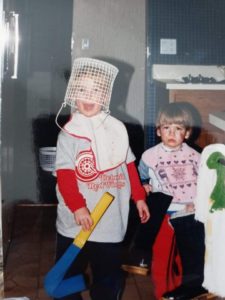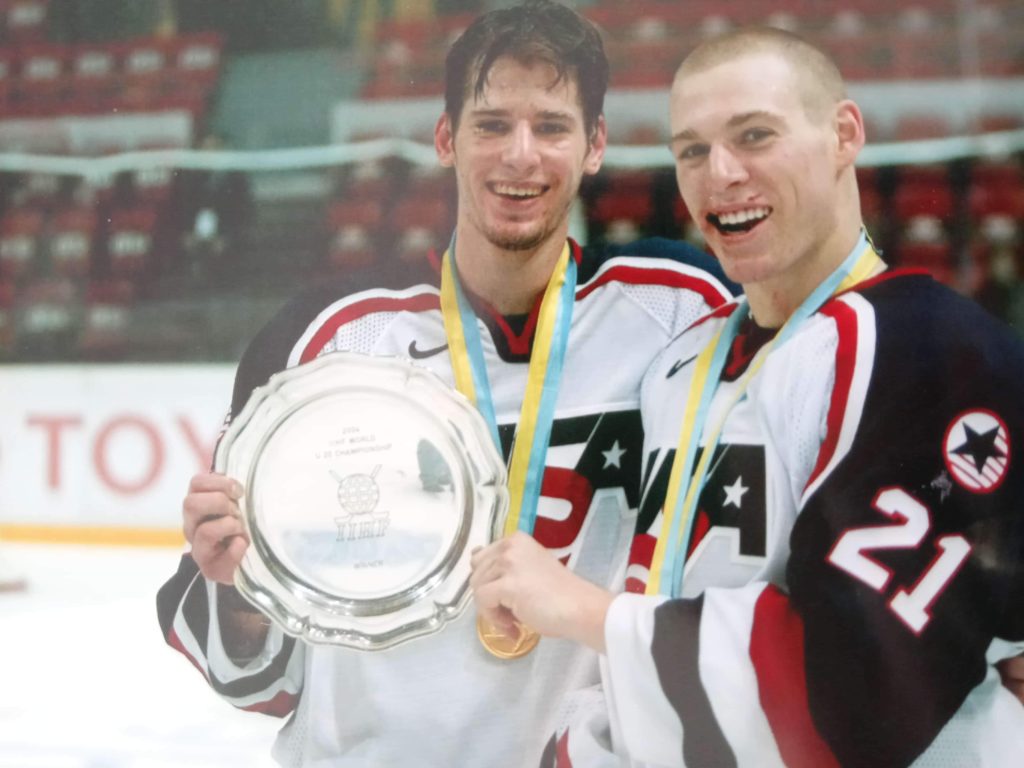The two most significant things that shaped my life growing up were the Detroit Red Wings and being raised in a Lutheran Church, in that order. When you grow up in Detroit, it is natural to idolize the Red Wings. They arguably had the best team in the history of the National Hockey League (NHL), winning 62 times in the 95-96 season. One of my best memories as a kid was being in attendance when they won the Stanley Cup in 1997. To be able to play for that same team 20 years later was the epitome of living one’s childhood dream.

Growing up in a Lutheran home shaped most of the values I still have today. I grew up hearing the stories of the Bible and hearing about God and Jesus. I learned about heaven and hell, of course. As a kid I just wanted to make sure I would get to heaven. My conclusion on how to get there was to be good, to the best of my definition of good. If I could keep the rules, I thought I’d have a pretty good chance of accomplishing my goal of getting to heaven.
The other goal I wanted to reach was making it to the NHL. Growing up as a teenager, I played for The Honeybaked Ham hockey team. We played against the best players and teams in North America and actually did very well against them. Seeing just how many good players there were, convinced me that I would never end up being one of the few to play in the NHL.
Through the help of my coaches and parents, I ended up receiving a scholarship to play for the Michigan State Spartans. While attending Michigan State, I switched my major each year. There wasn’t anything I found as exciting as hockey, and believing my hockey career was about to end, I kept hoping I’d find something I liked for a career. I switched from being a chemistry major, to a supply chain major, to marketing, and ended up graduating with a general management degree. I had no idea what I would do after college. I was nervous.
As it turns out, I was offered and signed a “take it or leave it” two way contract with the Florida Panthers of the National Hockey League. I thought this would buy me 3 years to figure out what I would do with my life. Starting out, I was at the bottom of the roster on the 4th line of Florida’s minor league team in Rochester, NY and was tossed in and out of the line up. But I was happy just to have a job (especially playing hockey) after college.
Then, from out of nowhere, on Nov 21st, 2006 I received the call to play in the NHL — I was heading to Boston to play against the Boston Bruins. I was 21 and now had the opportunity to play with some of the greatest players I knew and that I grew up watching. It was a feeling I will never forget and I didn’t look back. I did well enough when I got that chance that I earned a spot on Florida’s NHL roster. The following two seasons I ranked in the top 20 in the NHL for even-strength goals. My third year in the league, I broke the 30 goal mark. I was living the dream — I was playing and having success as a professional hockey player. I never imagined I would be living this kind of life. The fourth year of my career, I was slated to play on the second line for the USA Men’s Olympic Ice Hockey team at the 2010 Olympic games in Vancouver. I never dreamed I would reach this level of success.

During these times, the idea I grew up believing–be good and God will be there for you–seemed to be realistic. I kept climbing the ladder of success in the hockey world. It drove that desire in me to keep obeying the rules the best I could. I wanted God to reward me because of my actions. I was talking with God, going to church Sundays and Wednesdays when I could. I helped get a chapel program started on my team. I was checking the boxes that would identify me as a Christian. I would cling to verses like Philippians 4:13, Jeremiah 29:11, Joshua 1:9, Psalm 37:4. Stories of underdogs like David and Goliath, Moses and Pharaoh, Daniel in the Lion’s den, Joseph being sold into slavery, and others were my favorites. I was doing everything to advance my hockey career and keep all the rules so that God would bless me or, in a sense, owe me. I didn’t fully understand what the gospel meant.
I thought everything was perfect—in my life, in my career and even my view of a relationship with God—until October 2009 when one hit would overshadow everything and change my life forever.
In a split second, the trajectory of my career plummeted and this instance would define my entire hockey career, not the accomplishments. Just like that—I had experienced a severe concussion—everything stopped and I was challenged by the question: “Will I ever play again?” No Olympics. No hockey. Just bed. For the next 3 months I did nothing. And when I did return, I never played as well as I had prior to that concussion.
That’s the summary of my career. In a few paragraphs you have the extent of my success. If that is what life is all about — achieving your dream — then what should I do with my life as a retired 35 year old? It is true that a lot of professional athletes struggle with the transition from playing to retirement. I am right in the middle of it now. And the biggest part of that transition is realizing that I need to find my true identity in Christ as I am forced to face the fact that my identity was falsely based elsewhere in the past.
You see, when you have everything this world offers, you are never truly content. You still feel as if there is something else to achieve. There is something else that will make you happier. We can never put our finger on it and so we pursue this feeling at all costs. And the truth is these feelings of accomplishment or success always fade. They are never satisfied. Ask anyone that’s reached the top. It’s never enough.
It’s easy for me to see now how I did this with hockey. You need to be better than your competition. You need to win. You want to be better than your teammates. You want to move up in the lineup. You want the recognition of being the best and everything that comes with it. Then, you want a bigger contract. If the contract is bigger, that means you are better. It turns into a comparison game. Now once you have “made it,” you can get things, lots of things, believing those things will make you happy. Your sense of contentment simply shifts from making it to the top, to now putting your hope in the things that being at the top provides.
I have learned a lot though the game of hockey. I have seen what most people are really after in life. I was one of them. You see there is something that is hidden from you when you are a child dreaming of what you want to become. There is one thing that they don’t tell you about achieving your dream. It’s this — that dream in itself will never fulfill you. It will never give you ultimate peace.
“Despair does not lie in being weary of suffering, but in being weary of joy.”
G.K. Chesterton
And usually the way God breaks through this is with difficulties in your life. As in the story of the prodigal son — the younger brother first has his time of enjoyment. He pursues what he thinks will make him happy. He is given his inheritance in advance, all the riches he desired. But as the story unfolds, the good times end. They always do. All the riches you can have, and all the pleasure you pursue will leave you empty. Then the famine comes. The famine of the soul. And in this season of my life, I began to see more and more how I was living like the prodigal son.

When the world’s promises don’t satisfy, you’ll find yourself in some lonely and tough times. This is usually the most effective way God can get our attention. For me, I went from a top 20 scorer in the National Hockey League, to 3 years later scoring just 1 goal in an entire season. I ended up being traded, going from the 1st line to the 4th line, being sent to the minors, having my contract bought out, being let go after tryouts, and eventually moving my wife and I from our home to continue playing in Russia.
God will bring us to a point where he can show us that the things of this world won’t bring us true joy. And where does this lead us? Coming back to the Father. And so it happens, the son comes back home and tries now to earn his way back into the family. The theme of trying to earn our place in the world is so innate in us, it is one of the hardest ideas to break.
As a professional athlete you are judged every single day. Did we win? Did I score? How many points did I get? How many points do I have this season? Did I play well? Did I do my job? Even if the team won and I played badly, I was judged. If I played well and the team lost, it wasn’t good enough. I could have still been viewed as a failure.
The only way I could break free of approval addiction is by coming to Jesus with nothing. When I realized this, the famine turned into a feast. God provides everything that we need. He is so committed to us that he will do what is necessary to show us his love, which he proved on the cross.
It is easy to see now that I was trying to obey so God would be in debt to me. I was trying to earn favor. I was using God to get the stuff I really wanted — success in hockey, success in life. That’s why I liked the verses/stories I mentioned earlier. I was using them as a means to an end. For my self actualization, not realizing at the time they are all about Jesus. I was using God to get my ultimate god — hockey. I believed that if I had a good career in hockey I’d be happy in life. My happiness was found in something I would achieve rather than what Christ had achieved for me.
I have come to realize that was a very dangerous way to be living. What happens the moment everything you used to get meaning from is gone?

Then you wonder if you’ve been good enough, if you’ve been obeying enough, if you’re living the right way or wrong way. Have I kept God’s rules the way I should? Is it my actions that have caused tough times in my life and career? And here is the problem with what I was believing. When things are going well it’s easy to think of yourself as being superior to others. I have worked hard to get to where I am, I deserve this. The other people I’ve passed didn’t do what I’ve done. I’m better than them. So when things were going great I was doing my part for God. And when things weren’t going great that attitude shifted and I believed it was because of my failure. It’s easy to get caught up in self pity, to feel depressed. When your ‘god’ lets you down, these are natural emotions. Through the good and the bad, it’s easy to keep thinking about yourself.
It will be a constant battle if you get your meaning and purpose in life in anything other than Christ. With my career came all the other temptations of putting my hope and meaning in something other than Christ. I think God needed to continue to teach me his grace. After the concussion, the rest of my career was defined by failures and injuries—another concussion later in that season, later I went on to break my knee, ankle, foot, shoulder, tear my groin and labrum, have sports hernias, and severe herniated disks. It was a tough ride.
I am not sure I really understood the gospel while I was playing hockey. I believed in God, but I think it is through certain circumstances that God has a way of weaving his plan into your life. Just as the disciples in the beginning of the book of John said they believed, then proceeded to show signs of their unbelief. The story wasn’t written with them believing Jesus when they met him and then never straying from that belief. They needed constant reminders even while living with him!
This is why Jesus calls himself the Shepherd and us the sheep. Sheep wander. They get lost. They are forgetful. They are just plain stupid at times. Sheep don’t go to the shepherd for advice, what to eat, how to stay positive, or for how to live their best life now. The sheep are completely and utterly dependent on the shepherd for their life. Without the shepherd the sheep die.
Jesus had been in my life as a kid, a college student, and as a professional athlete. However, I am not sure I could say he was my shepherd. I realize now more than ever that the gospel needs to be preached daily to myself. Without it, life loses its meaning and purpose. I need the shepherd everyday of my life. When you see and understand the beauty of the gospel, the only response is a changed life.
Lord, you establish peace for us; all that we have accomplished you have done for us.
Isaiah 26:12





